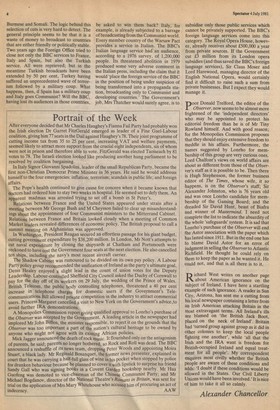Portrait of the Week
After everyone decided that Mr Charles Haughey's Fianna Fail Party had probably won the Irish election Dr Garret FitzGerald emerged as leader of a Fine Gael-Labour coalition, giving him 77 seats in the Dail against Haughey's 78. Their joint programme of cutting income tax from 35 to 25 per cent, increasing VAT and welfare payments, seemed likely to attract more support from the crucial eight independents, six of whom were not in prison and therefore able to vote. FitzGerald was elected Taoiseach by 81 votes to 78. The Israeli election looked like producing another hung parliament to be resolved by coalition bargaining.
In Italy Signor Giovanni Spadolini, leader of the small Republican Party, became the first non-Christian Democrat Prime Minister in 36 years. He said he would addresss himself to the four emergencies: inflation; terrorism; scandals in public life; and foreign affairs.
The Pope's health continued to give cause for concern when it became known that doctors had ordered him to stay two weeks in hospital. He seemed set to defy them. An apparent madman was arrested trying to set off a bomb in St Peter's. Relations between France and the United States appeared under strain after a meeting between Mr George Bush and M Cheysson failed to clear up misunderstandings about the appointment of four Communist ministers to the Mitterrand Cabinet. Relations between France and Britain looked cloudy when a meeting of Common Market leaders revealed differences of economic policy. The British proposal to call a summit meeting on Afghanistan was approved. In Washington, President Reagan secured an effortless passage for his giant budget, cutting government expenditure by $38,200 million. In London, Mr Nott's attempts to cut naval expenditure by closing the shipyards at Chatham and Portsmouth were reckoned to have cost the Government four seats at the next election. He also cancelled ten ships, including the navy's most recent aircraft carrier. The Shadow Cabinet was rumoured to be divided on its own pay policy. A Labour Party policy group recommended the unification of Ireland as the party's ultimate goal. Denis Healey enjoyed a slight lead in the count of union votes for the Deputy Leadership. Labour-controlled Sheffield City Council asked the Duchy of Cornwall to pay for the day off of its workers on 29 July, the wedding of the Prince of Wales. British Telecom, the public body controlling telephones, threatened a 40 per cent increase in telephone charges for domestic users if the Government's Telecommunications Bill allowed private competition in the industry to attract commercial users. Princess Margaret cancelled a visit to New York on the Government's advice,to avoid further IRA demonstrations.
A Monopolies Commission report giving qualified approval to Lonrho's purchase of the Observer was accepted by the Government. A leading article in the newspaper had implored Mr John Biffen, the minister responsible, to reject it on the grounds that the Observer was too important a part of the nation's cultural heritage to be owned by anyone who might not agree with its existing African policies. Mick Jagger announced the death of rock music. It flourished only on the antagonism of parents, he said; parents no longer bothered, so Rock and Roll was dead. The BBC announced a reshuffle of its news team, dropping Peter Woods and appointing Moira Stuart, a black lady. Mr Reginald Bosanquet, the former news presenter, explained in court that he was carrying a half-full glass of wine in his pocket when stopped by police for drunken behaviour because he planned to cover it with lipstick to surprise his friend Sandy Gall who was signing books in a Covent Garden bookshop nearby. Mr Hua Guofeng was demoted to vice-chairman of the Chinese Communist Party; and Mr Michael Bogdanov, director of the National Theatre's Romans in Britain, was sent for trial on the application of Mrs Mary Whitehouse who accused him of procuring an act of indecency. AAW






































 Previous page
Previous page